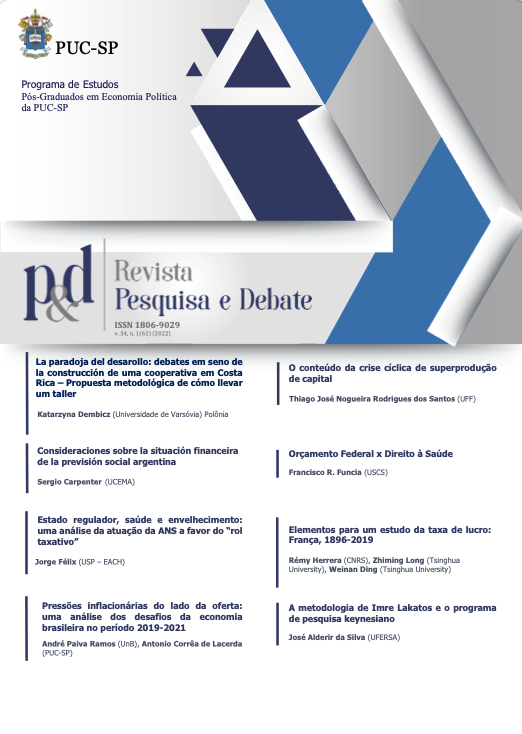O conteúdo da crise cíclica de superprodução de capital
DOI:
https://doi.org/10.23925/1806-9029.v34i1e60239Palabras clave:
crises, crise cíclica, superprodução de capital, lei geral de acumulação de capitalResumen
O fenômeno das crises é recorrente no capitalismo. Dentre as escolas da teoria econômica, a teoria marxista influencia o estudo das crises, porque identifica que as crises são internas ao modo de produção capitalista. O objetivo do trabalho é analisar o conteúdo da crise cíclica de superprodução de capital. A abordagem do trabalho é fundamentada na crítica da economia política de Karl Marx. O desenvolvimento do trabalho consiste na análise de um modelo teórico abstrato que permita compreender o germe da crise e o seu desenvolvimento à possibilidade de crise. Trata-se também de analisar a crise cíclica de produção de capital em duas passagens teóricas cumulativas. A primeira aborda o caráter da crise de superprodução, enquanto a segunda evidencia o aspecto cíclico da crise no capitalismo. Conclui-se que a associação da lei geral de acumulação do capital com a trajetória cíclica da economia, nos permite uma interpretação do conteúdo da crise cíclica de superprodução inserida na dinâmica do modo de produção capitalista.
Citas
CARCANHOLO, M. Causa e Formas de Manifestação da Crise: uma interpretação do debate marxista. Dissertação de Mestrado, UFF, RJ. 1996.
______. Dependencia, superexplotación del trabajo y crisis – Una interpretación desde Marx. Madrid: Maia, 2017.
CHESNAIS, F. Finance Capital Today – Corporations and banks in the lasting global slump. Boston: Brill. 2016. (Historical Materalism Book Series; v. 131).
DUMÉNIL, G; LÉVY, D. A crise do neoliberalismo. São Paulo: Boitempo, 2014.
HILFERDING, R. O Capital financeiro. São Paulo: Nova Cultural, 1985.
HUME, D. Escritos sobre economia. São Paulo: Abril Cultural, 1983.
LAPAVITSAS, C. Profiting without producing: How finance exploits us all. London, New York: Verso, 2013.
LUXEMBURGO, R. A acumulação do Capital. São Paulo: Nova Cultural, 1985
MARX, K; ENGELS, F. Cartas sobre “O Capital”. São Paulo: Expressão Popular, 2020.
______. O Capital: crítica da economia política. Livro I. 2 ed. São Paulo: Boitempo. 2017.
______. O Capital: crítica da economia política. Livro II. São Paulo: Boitempo. 2015.
______. O Capital: crítica da economia política. Livro III. São Paulo: Boitempo. 2017a.
______. Grundrisse: Manuscritos econômicos de 1857-1858: Esboços da crítica da economia política. São Paulo: Boitempo; Rio de Janeiro: Ed. UFRJ, 2011, 2ͣ reimpressão 2013.
______. Teorias da Mais-valia: história crítica do pensamento econômico. Livro IV de O Capital. Tomo II. Rio de Janeiro: Civilização Brasileira. 1983.
______. Teorias da Mais-valia: história crítica do pensamento econômico. Livro IV de O Capital. Tomo III. Rio de Janeiro: Civilização Brasileira. 1985.
MENDONÇA. A. A crise econômica e sua forma de contemporânea. Dissertação de Doutorado apresentada no Instituto Superior de Economia da Universidade Técnica de Lisboa, Lisboa, 1987.
NAKATANI, P; MARQUES, R. O capitalismo em crise. São Paulo: Expressão Popular, 2020.
RIBEIRO, N. R. A acumulação de capital no Brasil: expansão e crise. Dissertação de Doutorado apresentada no Instituto Superior de Economia da Universidade Técnica de Lisboa, Lisboa, 1988.
______ . A Crise Econômica: uma visão marxista. João Pessoa: Ed. Universitária – UFPB, 2008.
RICARDO, D. Princípios de Economia Política e Tributação. São Paulo: Abril Cultural, 1982.
ROBERTS, M. The long depression – How it happened, why it happened,and what happens next. Chicago: Haymarket Books. 2016.
SAY, J.B. Tratado de Economia Política. São Paulo: Abril Cultural, 1983.
SMITH, A. Investigação sobre a natureza e as causas da riqueza das nações. vol. I. São Paulo: Abril Cultural, 1983
Descargas
Publicado
Cómo citar
Número
Sección
Licencia
Derechos de autor 2022 Pesquisa & Debate

Esta obra está bajo una licencia internacional Creative Commons Atribución 4.0.


